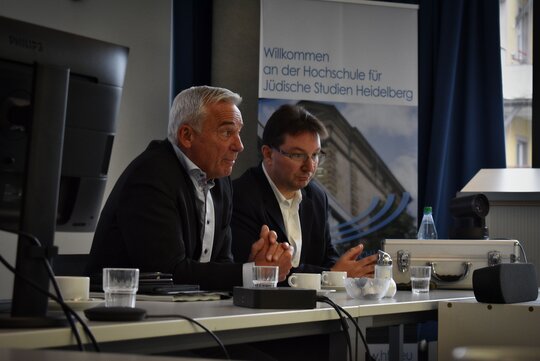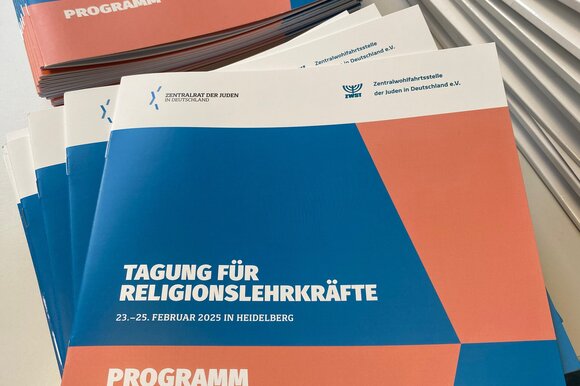The media interest in the visit by the Minister of the Interior Thomas Strobl and the Baden-Württemberg Commissioner for Anti-Semitism Dr Michael Blume on 3 November was so great that there was approximately one press representative, photographer or editor for every six students enrolled.
Cynically, it can be said that after 7 October, all of the state's politicians set out to be photographed in front of Jewish facilities or institutions that deal with Judaism. However, the accusation does not quite hold water when the delegation arrives with the express wish to talk to students uncensored in the presence of the press.
Statistics are supposed to help substantiate a perceived reality with figures or refute it with facts. According to Strobl, anti-Semitic crimes and actions in the low three-digit range were reported to the Baden-Württemberg State Office of Criminal Investigation between the Hamas terrorist attacks on 7 October and 23 October, but these were not recorded in a structured manner. "I am aware that the number of unreported offences is of course higher," says Strobl. The reassuring picture that the SZ, for example, tries to paint in its article on Strobl's visit, "Few anti-Semitic incidents at schools", based on figures for Baden-Württemberg, is therefore actually a worrying one - and not just a perceived one.
In just under two weeks since 7 October, more than seven offences or actions per day have been reported. This does not include the incidents in which the victims did not ask for help. And yes, "many schools also have counselling teachers and a total of 28 school psychological counselling centres for dealing with discrimination".
The problem with these figures is the fact that almost all measures only come into effect once something has already happened. And this is where perceived reality - namely the fear for one's own life - meets statistics: I first have to become a victim before anything is done.
Jewish students at the HfJS told Strobl and Blume about their own experiences; be it at a vigil in Mannheim on the Hamas terror attacks, during which a student was told that Hitler had "done everything right", or at a tendentious, anti-Israeli lecture at the WeltHaus Heidelberg, during which over 50 sympathisers of the self-proclaimed Palestine activist Georg Steins created such a tense atmosphere that three students present kept their affiliation to the HfJS to themselves for good reason. Polarisation is spreading - or in the words of Blume: "Dualism always generates extremism, that's the dangerous thing".
There is no shortage of ideas for preventing radicalising developments in good time: Angelika Stabenow, head of the HfJS library, suggests, for example, organising more school class excursions to the university in order to give children the space to deal with the unknown. The university rabbi Shaul Friberg also confirms: "It is the unfamiliar that causes fear. I'm constantly in dialogue with students, Jews, Muslims and Christians - but I usually meet people who don't have these blinkers on."
The Central Council's "Meet a Jew" project is also attended by people who are already remarkably open-minded, says Blume, adding that teachers are often over-educated when it comes to the Middle East conflict, anti-Semitism or the history of Israel.
Another project aims to tackle this problem: Prof. Dr Johannes Becke, holder of the Ben-Gurion Chair for Israel and Middle East Studies at the HfJS, is working with the Department of Islamic Studies at Heidelberg University to arrange for a teacher to be seconded to the Heidelberg site "in order to organise school-based training courses on the history and politics of Israel and the Middle East in coordination with the Centre for School Quality and Teacher Training in Baden-Württemberg". Unlike the existing pilot project in Bavaria, where the position is based at the Department of Jewish History, the Heidelberg project aims to bring the two subjects together as equals. The aim is to create an opportunity for pupils to engage with the most important topics in the region. "Heidelberg is ideal for this project," says Becke: "The transfer of knowledge between Jewish Studies and Islamic Studies has already been tried and tested. The Master's students in Middle Eastern Studies benefit from precisely this link, which is intended to do justice to the diversity of Israeli society, but also of neighbouring societies." Teaching materials could be developed together with student teachers and tested by the Centre for School Quality and Teacher Training. The idea is to develop knowledge transfer options for all types of schools and also to be able to address potential emotional interdependencies - something that many teachers are currently unable to cope with.
Rawan Osman, a Syrian-Lebanese student at the HfJS who has been working as a peace activist for several years, is also emotionally involved. "We must not forget that many refugee children and young people from Islamic countries have grown up with anti-democratic disinformation and a deeply rooted anti-Semitic world view," says Osman. The anti-Israeli stereotypes can often not be combated if knowledge is only taught in schools and primarily in German. "We need low-threshold information programmes that are academically sound and attractively designed. And above all: presented in Arabic." Osman developed "ArabAsk" together with Lukas Stadler, historian and Jewish studies scholar at the HfJS, who has already written a brochure for the Jewish community in Graz to prevent anti-Semitism, and David Lüllemann, Master's student at the HfJS, who has many years of experience in training courses to raise awareness of anti-Semitism. A project consisting of educational short videos for TikTok and Instagram, which are dedicated to individual aspects of controversial topics such as the Middle East conflict, Muslim anti-Semitism, conspiracy theories and anti-Islamic racism, and explain them in an appealing way in Arabic. In addition, the description of the videos provides references to serious, academic literature in Arabic, German and English. All three students hope that the videos will encourage participation among Arabic-speaking people in Germany who have so far remained silent. Osman has already achieved over half a million views on various social media with a private video, after it was shared by Israel's Foreign Ministry and a Syrian opposition media outlet.
However, the project is still in its infancy and is waiting for funding to support it.
The idea is good, but the world is not yet ready? (Tocotronic)
While the Minister of the Interior primarily wanted to send out a signal of solidarity with his visit and is convinced that we are all called upon to oppose hatred and agitation, keyword: "Anti-Semitism has never gone away", Dr Blume was actually enthusiastic about the various approaches that can counteract both home-grown and migrant anti-Semitism. It remains to be seen how sustainable this enthusiasm will be in terms of providing funds to realise the various project ideas.
The most important sign in all these visits seems to be to follow up words with joint action so that a truly positive picture can be painted on the basis of figures.




